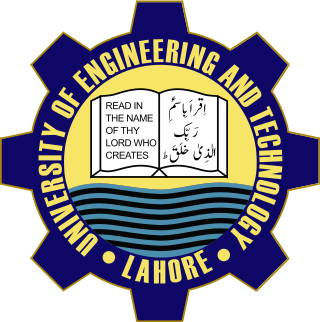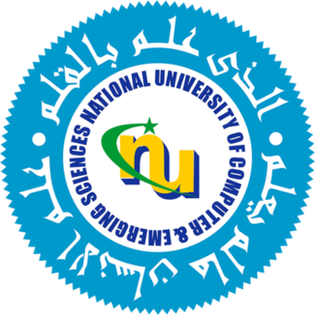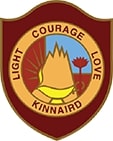Related Research Articles

The University of Engineering and Technology, Lahore is a public university located in Lahore, Punjab, Pakistan specializing in science, technology, engineering, and mathematics (STEM) subjects. It is the oldest and one of the most selective engineering institutions in Pakistan.Every year around 40,000 candidates appear in ECAT while there are around 3,045 fully subsidized and partially subsidized seats available in UET Lahore and its campuses, making the selection ratio of 7.6% in ECAT based disciplines.

Lahore University of Management Sciences (LUMS) (Urdu: جامعۂ لاہور برائے علومِ انتظامیات) is a private research university in Lahore, Punjab, Pakistan.

The National University of Computer and Emerging Sciences (NUCES), commonly known as Foundation for Advancement of Science and Technology (FAST), is a private research university with multiple campuses in different cities of Pakistan.

The University of the Punjab, also referred to as Punjab University, is a public research university located in Lahore, Punjab, Pakistan. It is the oldest and largest public sector university in Pakistan.

The School District of Philadelphia (SDP) is the school district that includes all school district-operated public schools in Philadelphia. Established in 1818, it is largest school district in Pennsylvania and the eighth-largest school district in the nation, serving over 197,000 students as of 2022.

Education in Pakistan is overseen by the Federal Ministry of Education and the provincial governments, while the federal government mostly assists in curriculum development, accreditation and the financing of research and development. Article 25-A of the Constitution of Pakistan obligates the state to provide free and compulsory quality education to children of the age group 5 to 16 years. "The State shall provide free and compulsory education to all children of the age of five to sixteen years in such a manner as may be determined by law". Considering the challenges confronting the youth in Pakistan, it's hardly astonishing that well-off and educated young individuals and professionals are opting to depart the country whenever they have the opportunity, exacerbating the brain drain phenomenon.

The University of Management and Technology (UMT) is a top ranked private research university located in Lahore, Pakistan. It is chartered by the Government of Punjab and is recognized by the Higher Education Commission of Pakistan (HEC) in the W4 category(highest category), the highest attainable HEC ranking for Pakistani universities. UMT is known for its generous scholarship program whereby 62% of the total student body study on some sort of scholarship. https://ilm.fund/

The Kinnaird College for Women (KCW) is a university located in Lahore, Pakistan. It is a women's liberal arts university.

The Punjab Colleges is a group of colleges active in Punjab, Pakistan.

Services Institute of Medical Sciences, established in 2003, is a public medical school located in Lahore. Services Hospital and Punjab Institute of Mental Health are the affiliated teaching hospitals. It is officially abbreviated as SIMS.

The Citizens Foundation (TCF) is a non-profit organization, and one of the largest privately owned networks of low-cost formal schools in Pakistan. The foundation operates a network of 1,833 school units, educating 280,000 students through over 13,000 teachers and principals, and over 17,400 employees. Approximately 94% of the foundation's expenditure is allocated to the Education program. In addition, TCF also conducts a literacy and numeracy skill development program in communities linked to its schools which has taught reading and writing to over 160,000 adults.
The Beaconhouse School System (BSS), established in 1978, is a private preparatory school system in Pakistan. Today, Beaconhouse has over 146 campuses in major cities across Pakistan. BSS also operates independent divisions in Belgium, Malaysia, Oman, the Philippines, Thailand, the UAE and the United Kingdom. Its activities extend beyond education in some countries.
Iqbal Zafaruddin Ahmed or Iqbal Z. Ahmed is a businessman and philanthropist of Pakistan.
The education system in Lahore is formulated along specific modern, religious, cultural, social, psychological, commerce and scientific injunctions. Lahore is Pakistan’s largest producer of professionals in the fields of science, technology, IT, engineering, medicine, nuclear sciences, pharmacology, telecommunication, biotechnology and microelectronics. Most of the reputable universities are public, but in recent years there has also been an upsurge in the number of private universities. The current literacy rate of Lahore is 64%. The standard national system of education is mainly inspired from the British system. The system also aims to imbibe a secular outlook among the students with the awareness of the rich cultural heritage of Pakistan. Lahore has a wide range of schools, colleges and universities that caters to diverse streams.
A sustainability organization is (1) an organized group of people that aims to advance sustainability and/or (2) those actions of organizing something sustainably. Unlike many business organizations, sustainability organizations are not limited to implementing sustainability strategies which provide them with economic and cultural benefits attained through environmental responsibility. For sustainability organizations, sustainability can also be an end in itself without further justifications.

Pakistan Institute of Fashion and Design (Urdu: پاکستان انسٹی ٹیوٹ آف فیشن اینڈ ڈیزائن), also referred as PIFD, is a public design institution primarily located in Lahore, Punjab, Pakistan. It was established in 1994 as the Pakistan School of Fashion Design (PSF) by the Trade Development Authority of Pakistan, a department within the Ministry of Commerce. The close collaboration between the textile industry, Erasmus+, Commonwealth Association, business and arts communities is intended to foster multi-disciplinary education and research.

The American International School System (AISS) is a private coeducational school following an American-based curriculum. Located in Lahore, Pakistan, the school offers education from Pre-Kindergarten through Grade 8 with plans to expand through high school.

Green Crescent Trust (GCT) is a non-profit organisation in Sindh, Pakistan that focuses on education and development. It was established in 1995 by group of people with just one goal: making a better Pakistan through education. It started out with just one school and handful of students in Karachi.

The Bilqees Sarwar Foundation (BSF) is a registered non-profit organization based in Lahore, Pakistan, which provides public health and education support to the local community as well as around the world. It was established by the Sarwar family, and cooperates with NRS International, a Dubai-based disaster relief supplier with a manufacturing facility in Pakistan.
References
- 1 2 3 4 5 6 "PEN: Seeking to provide quality education to a million children by 2025". Pakistan Today newspaper. 25 January 2014. Archived from the original on 1 December 2017. Retrieved 16 September 2024.
- ↑ Arif Butt; Shezeen Hemani (October 1, 2012). "Case Study: Progressive Education Network (PEN): Creating Social Impact in Pakistan". Harvard Business Review. Retrieved 27 November 2017.
- ↑ "Non-profit to take charge of 50 public schools". The Express Tribune newspaper. 3 July 2016. Archived from the original on 1 December 2017. Retrieved 16 September 2024.
- ↑ Rabea Malik; Faisal Bari; et al. (August 2015). "Partnerships for Management in Education: Evidence from Punjab and Sindh" (PDF) (research report). Institute of Development and Economic Alternatives.